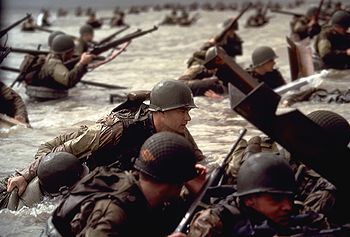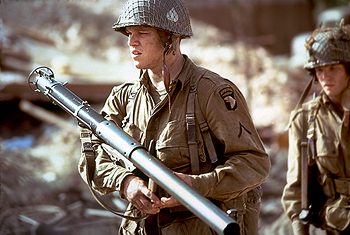This site is best
viewed at 800x600
and 16 bit color.
THE BEST WAR MOVIE EVER?
"SAVING PRIVATE RYAN" WILL TAKE YOU WHERE NO AUDIENCE HAS GONE BEFORE
By Thomas McKelvey Cleaver | 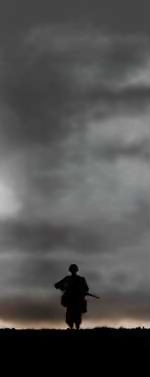 |
| I have been looking forward to seeing "Saving Private Ryan" since I first heard who was making it and who would be in it. I don't think that either I or the audience I saw it with on opening day were disappointed. Surprised? Yes. Shocked? I am certain. Amazed? Most definitely. Touched in a way no other movie has ever done before? Well...yes. I know I was, and the rest of that silent group who sat through the closing credits were either enormously moved by what they had just experienced or they all deserved Academy Award nominations for acting. Let's deal with the most obvious first: I am a combat veteran and I was shocked by the intensity of the scenes of violence in this motion picture. When the ramp of that landing craft goes down, you will be thrown into hell for the next twenty-seven minutes. Omaha Beach is described in the history |
| books as a "slaughter," but what comes gives a whole new meaning to that word as men are enveloped in flames, ripped to shreds by bullets, dead as soon as they hit the beach, or - in an agonizing mixture of horror and beauty - dying in slow-motion as they are dragged under by the weight of their gear. "You have never seen anything like it" seems such a pathetic term, so"Hollywood" in the worst sense, but this time it is absolutely true. There is nothing that glorifies what is shown, only the relentless eye of the camera forcing you to see hell come to earth when a soldier, his arm blown off, picks up what's left, or as another, his intestines strewn on the beach around him, receives the last rites from a chaplain. That said, there is not one gratuitously-violent frame of film in this movie. This is a war where American soldiers shoot surrendering Germans, where decent and altruistic actions are fatal, and death is random, stupid, and redeems virtually nothing. Beware of this and consider it when deciding to go. Do I recommend that you do go? Yes! Without the slightest reservation. | 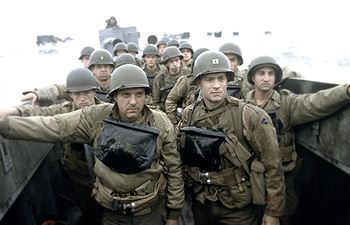
|
| "Saving Private Ryan" is proof that film is a director's medium, not a writer's, because Spielberg here elevates what would otherwise be a pretty pedestrian screenplay into greatness. (And I say this as a screenwriter.) I am sure that the uncredited rewrite of Writer-Director Frank Darabont ("The Shawshank Redemption") was crucial to bringing the elements into the script that allow the actors to put meat on the bones of these characters.
|
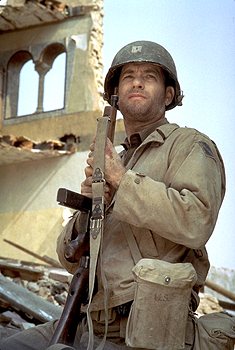 | Tom Hanks plays Captain Miller, a man who - after invading North Africa, Sicily, Salerno and Anzio - has been ordered to one invasion too many here in Normandy. From the opening moment in the landing craft, with men sick with fear and seasickness all around him, as he tries to calm a hand that won't stop trembling, this is a man on the edge of survival. He is exactly the kind of officer any man who has ever gone to war would want to follow: he can give orders that result in the death of those he knows because he believes that the goal is right (though there is one telling scene where he has to convince himself of that yet again), but he is very far from unfeeling, and does his best with limited resources to give each a chance to the extent possible. He is no John Wayne knockoff, just a guy with an awful job to do who hopes he has the internal resources to carry it out. I knew this was a man I would follow when, after a firefight whose necessity is questionable, he cries: not only for the death of those who will never return because of his order, but for the death of those who left home who |
| will return forever different. Probably no other actor currently working presents "decent" as well as Hanks, and here he is the best of us: the man taken unwillingly from home to war, who does what he must to have it over with and return.
|
| Hanks' eight man squad is extremely well-cast, from veteran Tom Sizemore as Sergeant Horvath, here doing his best work ever; independent film writer/director/actor Edward Burns as Brooklyn boy and BAR man Reiben; Jeremy Davis as the newly-added Corporal Upham, who will take us on an emotional journey into the true nature of cowardice few will forget; Giovanni Ribisi as the medic, Wade; Vin Diesel as Caparzo; Adam Goldberg as Mellish, a |  |
| Jewish soldier whose reason for fighting as hard as he does is he knows what the Germans are doing in places like Auschwitz; and Barry Pepper as Jackson, the sharp-shooting southerner who asks God to "give me the strength" each time he fires his '03 Springfield with such deadly effect. As the object of the search, newly-minted superstar Matt Damon turns in a strong performance. Dennis Farina and Ted Danson appear in small but crucial roles and are very good for those moments.
|
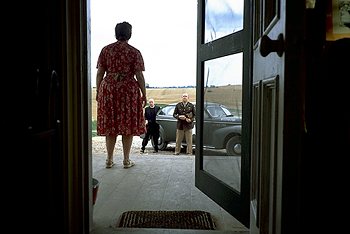
| When told he's going in search of a soldier whose three brothers have died in combat, to "bring him home," Captain Miller doesn't want this "public relations gambit." His men don't either. "Ryan better be worth it," Miller says. "He better go home and cure some disease or invent a new, longer-lasting light bulb." The strongest parts of the movie are the first act (the invasion) and the third act (the firefight in the village). Second act is a journey through the greatest invasion in history, with beautiful and telling moments in a French village in the middle of a rain storm, in a field full of crashed gliders and wounded men, in a moment that questions whether "civilized behavior" is not merely a good way to get killed in combat. This is proof that when he challenges himself, Steven Spielberg is definitely the best director currently working in film, and one of the greatest ever. That said, I wish that - nearly sixty years after the event - the opposing Germans |
| could have been something more than well-done "World War II movie" caricatures. In a well-made drama, the hero can only be good against a worthy enemy, and here the enemy is not necessarily the Germans, unfortunately. I am certain that Tom Hanks has just become the front-runner to become the only actor to ever receive three Best Actor Oscars within six years of each other, and Steven Spielberg is very likely to take home another Best Director Oscar. This movie stands with "The Big Parade," "All Quiet On The Western Front," "The Bridges at Toko-Ri," and "Full Metal Jacket," (all of them, interestingly enough, written by people who knew of what they wrote from experience) as movies that prove what an old non-com told me shortly before I found out first-hand how true his statement was: "Being a hero in a war is when you're so scared you've messed yourself completely and your brain is frozen, and you do your job anyway." Go see this great, great movie.
|
Saving Private Ryan
Saving Private Ryan, Max Allen Collins. $5.20
Saving Private Ryan: A Film By Steven Spielberg, Steven Spielberg $29.95
World War Two History
Citizen Soldiers: The U.S. Army from the Normandy Beaches to the Bulge to the Surrender of Germany, June 7, 1944-May 7, 1945, Stephen E. Ambrose $19.25
D-Day
June 6, 1944: The Climactic Battle of World War II, Stephen Ambrose
$21.00
Band of Brothers: E Company, 506th Regiment, 101st Airborne from Normandy to Hitler's Eagle's Nest, Stephen E. Ambrose $10.40

